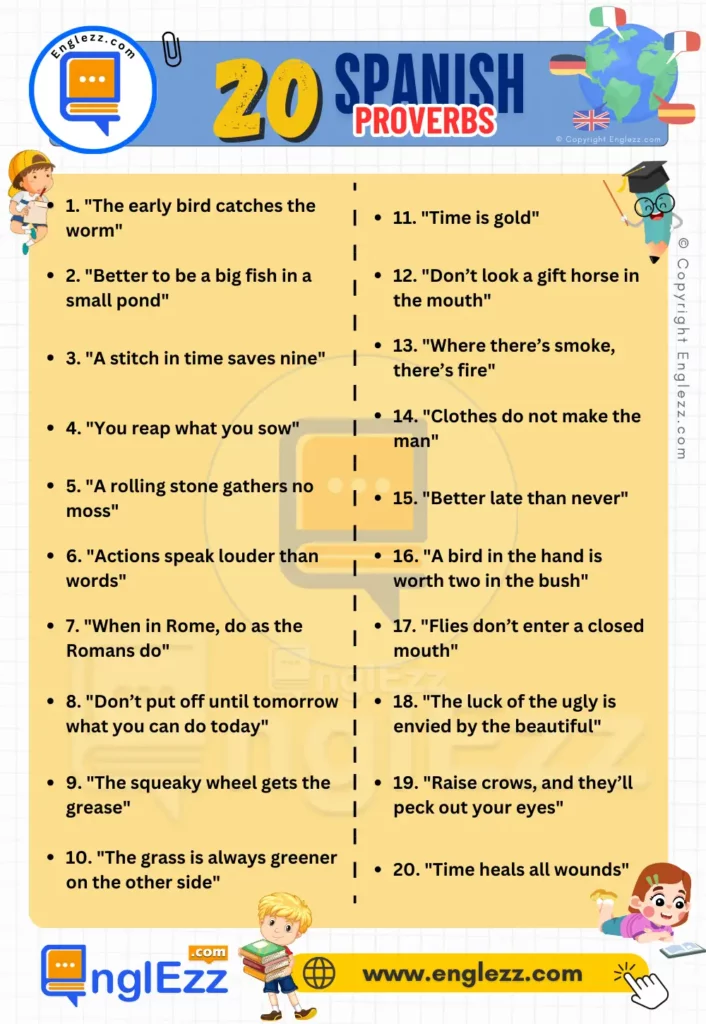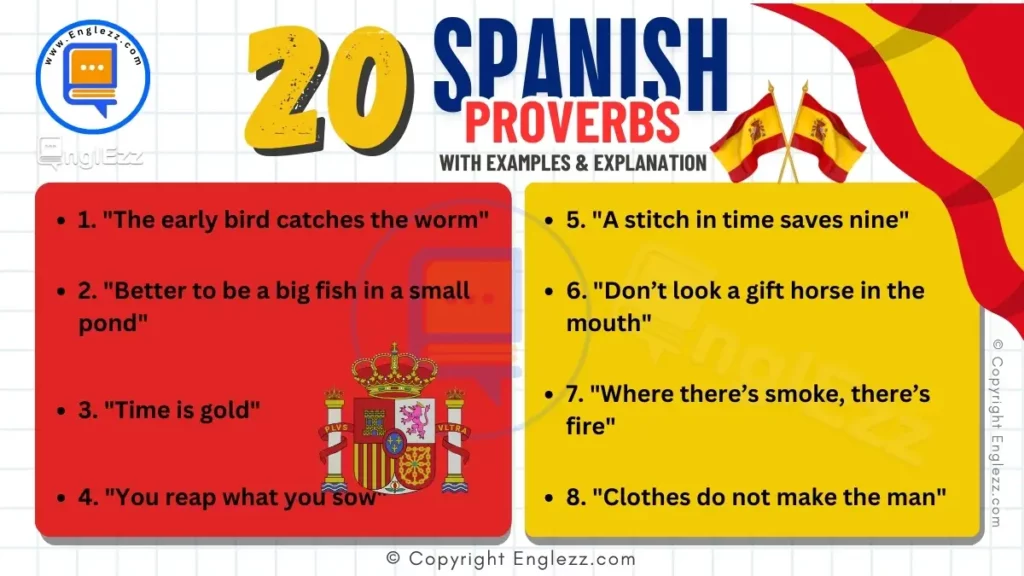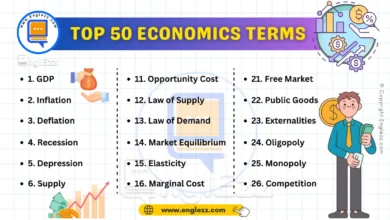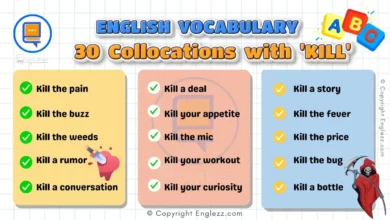Proverbs are timeless expressions of wisdom that transcend cultures and languages. Spanish proverbs, known as “refranes,” carry profound meanings and insights, offering a glimpse into the values and beliefs of Spanish-speaking cultures. In this blog post, we’ll explore 20 popular Spanish proverbs in English, their phonetic transcriptions, meanings, and examples translated into English.
Understanding these proverbs will enhance your ability to communicate more effectively in both Spanish and English, as well as appreciate the cultural nuances that each language brings to the table.
Explore 20 Spanish Proverbs in English: Meanings and Examples
By understanding these proverbs and their English translations, you not only gain insight into the language but also into the shared human experience. Whether you’re a language learner looking to deepen your understanding of Spanish or an enthusiast of cultural wisdom, these proverbs will enrich your vocabulary and perspective.
For those who wish to delve deeper into learning Spanish or improving their English, consider exploring our courses and English exercises online. These resources will help you master proverbs and other language elements that are key to becoming fluent. Now, let’s dive into these 20 Spanish proverbs and discover the wisdom they hold.
#1. “Más vale tarde que nunca” 🚀
Translation: “Better late than never”
Original Spanish: Más vale tarde que nunca
Explanation: This proverb emphasizes that it is better to do something late than not to do it at all. It suggests that taking action, even if delayed, is preferable to inaction.
Phonetic Transcription: [mas ˈβale ˈtaɾðe ke ˈnunca]
Examples:
- I know you missed the deadline, but submitting the report now is better late than never.
- “He finally started exercising; better late than never, right?”
#2. “A buen hambre no hay mal pan” 🍞
Translation: “When you’re hungry, no bread is bad”
Original Spanish: A buen hambre no hay mal pan
Explanation: This proverb means that when someone is truly in need, they will appreciate whatever help or resources they receive, no matter how modest.
Phonetic Transcription: [a βwen ˈambre no ai mal pan]
Examples:
- “After a long day of hiking, that simple sandwich tasted amazing—when you’re hungry, no bread is bad.”
- “He accepted the job offer, even though it wasn’t his ideal position; when you’re hungry, no bread is bad.”
#3. “El que mucho abarca, poco aprieta” 🌍
Translation: “He who grasps too much, holds little”
Original Spanish: El que mucho abarca, poco aprieta
Explanation: This saying warns against taking on too many responsibilities at once, as it can lead to poor outcomes. It suggests that focusing on fewer tasks will lead to better results.
Phonetic Transcription: [el ke ˈmuʧo aˈβaɾka ˈpoko aˈpɾjeta]
Examples:
- She’s involved in numerous projects at work, but she’s not excelling in any of them—he who grasps too much, holds little.
- “If you try to manage multiple tasks simultaneously, you might end up not doing any well; remember, he who grasps too much, holds little.”
#4. “Quien no arriesga, no gana” 🎲
Translation: “He who doesn’t risk, doesn’t win”
Original Spanish: Quien no arriesga, no gana
Explanation: This proverb suggests that taking risks is necessary to achieve success. Without stepping out of your comfort zone, you cannot expect to gain rewards.
Phonetic Transcription: [kjɛn no aˈɾjesɣa no ˈɡana]
Examples:
- “He decided to invest in the startup, understanding that he who doesn’t risk, doesn’t win.”
- “If you’re afraid to ask for a promotion, remember: he who doesn’t risk, doesn’t win.”
#5. “En casa de herrero, cuchillo de palo” 🏠
Translation: “In the blacksmith’s house, a wooden knife”
Original Spanish: En casa de herrero, cuchillo de palo
Explanation: This proverb points out the irony of not having something that should be abundant in a particular context. It often highlights the disparity between one’s profession and personal life.
Phonetic Transcription: [en ˈkasa de eˈʁeɾo kuˈtʃiʝo de ˈpalo]
Examples:
- “The carpenter’s own furniture was falling apart; it’s like the saying goes, in the blacksmith’s house, a wooden knife.”
- “Even though she’s a chef, her kitchen is poorly equipped—just like in the blacksmith’s house, a wooden knife.”
#6. “Dime con quién andas y te diré quién eres” 👥
Translation: “Tell me who you hang out with, and I’ll tell you who you are”
Original Spanish: Dime con quién andas y te diré quién eres
Explanation: This proverb suggests that a person’s character can be judged by the company they keep. It implies that one’s associations reflect their true self.
Phonetic Transcription: [ˈdime kon ˈkjen ˈandas i te diˈɾe ˈkjen ˈeɾes]
Examples:
- “His friends are all successful entrepreneurs—dime con quién andas y te diré quién eres.”
- “She often surrounds herself with kind and supportive people, showing that, as they say, tell me who you hang out with, and I’ll tell you who you are.”

#7. “El que algo quiere, algo le cuesta” 💪
Translation: “If you want something, you have to work for it”
Original Spanish: El que algo quiere, algo le cuesta
Explanation: This proverb underscores the idea that achieving one’s desires requires effort and sacrifice. Nothing worthwhile comes without a cost.
Phonetic Transcription: [el ke ˈalɣo ˈkjeɾe ˈalɣo le ˈkwesta]
Examples:
- “She worked tirelessly to achieve her dream job—el que algo quiere, algo le cuesta.”
- “He knew that starting his own business would be challenging, but he accepted it because, if you want something, you have to work for it.”
#8. “Más vale pájaro en mano que ciento volando” 🕊️
Translation: “A bird in the hand is worth more than a hundred flying”
Original Spanish: Más vale pájaro en mano que ciento volando
Explanation: This saying advises valuing what you already have rather than risking it for something uncertain. It emphasizes the importance of appreciating and securing what is already within reach.
Phonetic Transcription: [mas ˈβale ˈpaxaro en ˈmano ke ˈsjento βoˈlando]
Examples:
- “She decided to take the stable job offer rather than risk it for a chance at a higher position—más vale pájaro en mano que ciento volando.”
- “He chose to keep his current car instead of trading it for a chance at a new model; after all, a bird in the hand is worth more than a hundred flying.”
#9. “Ojos que no ven, corazón que no siente” 👀
Translation: “Out of sight, out of mind”
Original Spanish: Ojos que no ven, corazón que no siente
Explanation: This proverb suggests that if you do not see something, you are less likely to be affected by it emotionally. It reflects the idea that distance or absence can reduce emotional impact.
Phonetic Transcription: [ˈoxos ke no βen koɾaˈθon ke no ˈsjente]
Examples:
- “She was able to move on from her old job quickly because, as they say, ojos que no ven, corazón que no siente.”
- “He forgot about the argument once they stopped talking; it’s true what they say, out of sight, out of mind.”
#10. “No hay mal que por bien no venga” 🌟
Translation: “Every cloud has a silver lining”
Original Spanish: No hay mal que por bien no venga
Explanation: This proverb suggests that even in difficult or bad situations, there is something positive that can come from it. It encourages optimism and seeing the good in adverse circumstances.
Phonetic Transcription: [no aj mal ke poɾ ˈβjen no ˈβeŋɡa]
Examples:
- “Losing her job was tough, but it led her to pursue her passion—no hay mal que por bien no venga.”
- His car accident resulted in a new job opportunity, proving that every cloud has a silver lining.
#11. “El que no llora, no mama” 👶
Translation: “The squeaky wheel gets the grease”
Original Spanish: El que no llora, no mama
Explanation: This saying implies that if you do not speak up or make your needs known, you will not receive help or benefits. It highlights the importance of expressing your needs.
Phonetic Transcription: [el ke no ˈʝoɾa no ˈmama]
Examples:
- “She got the promotion because she was vocal about her achievements—el que no llora, no mama.”
- “If you want to get noticed, you need to make some noise; after all, the squeaky wheel gets the grease.”
#12. “Más vale ser cabeza de ratón que cola de león” 🐭🦁
Translation: “Better to be a big fish in a small pond”
Original Spanish: Más vale ser cabeza de ratón que cola de león
Explanation: This proverb suggests that it is better to be an important figure in a small or less significant place than a minor one in a more prestigious setting. It values influence and importance over status.
Phonetic Transcription: [mas ˈβale seɾ kaˈβeθa de raˈton ke ˈkola de leˈon]
Examples:
- “He chose to lead a small but influential company rather than join a larger corporation—más vale ser cabeza de ratón que cola de león.”
- She preferred to be a top student in a small college rather than a mediocre one in a big university.
#13. “El hábito no hace al monje” 🧥
Translation: “Clothes do not make the man”
Original Spanish: El hábito no hace al monje
Explanation: This proverb means that a person’s true nature is not determined by their appearance or outward attributes. It emphasizes that character is more important than superficial aspects.
Phonetic Transcription: [el ˈaβito no ˈase al ˈmoŋxe]
Examples:
- “Just because he wears a suit doesn’t mean he’s competent—el hábito no hace al monje.”
- “She might look wealthy, but her true character shines through; after all, clothes do not make the man.”
#14. “A caballo regalado no se le mira el diente” 🎁
Translation: “Don’t look a gift horse in the mouth”
Original Spanish: A caballo regalado no se le mira el diente
Explanation: This saying advises not to criticize or be overly critical of a gift or favor you receive. It suggests that one should be grateful for what is given without scrutinizing it.
Phonetic Transcription: [a kaˈβaʝo reɣaˈlaðo no se le ˈmiɾa el ˈðjente]
Examples:
- “She didn’t complain about the old car she received; after all, don’t look a gift horse in the mouth.”
- “He accepted the free tickets without hesitation—don’t look a gift horse in the mouth.”
#15. “Cuando el río suena, agua lleva” 🌊
Translation: “Where there’s smoke, there’s fire”
Original Spanish: Cuando el río suena, agua lleva
Explanation: This proverb suggests that rumors or signs usually have some basis in fact. It implies that if something appears to be happening, there is likely some truth to it.
Phonetic Transcription: [ˈkwando el ˈri.o ˈswe.na ˈaɣwa ˈʝeβa]
Examples:
- “There are always talks about changes in the company; when the river sounds, it carries water.”
- “The increased noise around the project suggested something was happening—where there’s smoke, there’s fire.”
#16. “La suerte de la fea, la bonita la desea” 🍀
Translation: “The luck of the ugly is envied by the beautiful”
Original Spanish: La suerte de la fea, la bonita la desea
Explanation: This proverb implies that people often envy or desire what others have, regardless of their own situation. It highlights the universal nature of envy.
Phonetic Transcription: [la ˈsweɾte de la ˈfe.a la boˈnita la deˈsea]
Examples:
- “Despite her good fortune, people still envied her—la suerte de la fea, la bonita la desea.”
- “The new car attracted envy from everyone; as they say, the luck of the ugly is envied by the beautiful.”
#17. “Cría cuervos y te sacarán los ojos” 🦅
Translation: “Raise crows, and they’ll peck out your eyes”
Original Spanish: Cría cuervos y te sacarán los ojos
Explanation: This proverb warns about the potential dangers of helping or nurturing those who may turn against you. It reflects the idea of betrayal by those you have assisted.
Phonetic Transcription: [ˈkɾi.a ˈkweɾβos i te sa.kaˈɾan los ˈoxos]
Examples:
- “He felt betrayed by his former colleagues; cría cuervos y te sacarán los ojos.”
- “Helping them might backfire on you—raise crows, and they’ll peck out your eyes.”
#18. “En boca cerrada no entran moscas” 🦟
Translation: “Flies don’t enter a closed mouth”
Original Spanish: En boca cerrada no entran moscas
Explanation: This saying means that keeping quiet can prevent unnecessary trouble or problems. It emphasizes the virtue of silence in certain situations.
Phonetic Transcription: [en ˈβoka seˈraða no ˈentɾan ˈmoskas]
Examples:
- “She avoided a heated argument by staying silent—en boca cerrada no entran moscas.”
- “Keeping quiet about sensitive issues is often wise; after all, flies don’t enter a closed mouth.”
#19. “No dejes para mañana lo que puedas hacer hoy” ⏳
Translation: “Don’t put off until tomorrow what you can do today”
Original Spanish: No dejes para mañana lo que puedas hacer hoy
Explanation: This proverb advises against procrastination. It encourages taking action and completing tasks promptly rather than delaying them.
Phonetic Transcription: [no ˈðexes ˈpaɾa maˈɲana lo ke ˈpweðas aˈθeɾ oɪ]
Examples:
- “He finished the report ahead of the deadline, following the advice: don’t put off until tomorrow what you can do today.”
- “She tackled her chores immediately; no dejes para mañana lo que puedas hacer hoy.”
#20. “El tiempo todo lo cura” ⏰
Translation: “Time heals all wounds”
Original Spanish: El tiempo todo lo cura
Explanation: This proverb suggests that the passage of time can help heal emotional and physical wounds, bringing relief and resolution to difficult situations.
Phonetic Transcription: [el ˈtjem.po ˈtoðo lo ˈkuɾa]
Examples:
- “After the breakup, she struggled, but eventually, el tiempo todo lo cura.”
- “He found solace in time—time heals all wounds.”
Spanish Proverbs in English Table
| 1. “The early bird catches the worm” | 11. “Better to be a big fish in a small pond” |
| 2. “Time is gold” | 12. “Don’t look a gift horse in the mouth” |
| 3. A stitch in time saves nine”13. “Where there’s smoke, there’s fire” | |
| 4. “You reap what you sow” | 14. “Clothes do not make the man” |
| 5. “A rolling stone gathers no moss” | 15. “Better late than never” |
| 6. “Actions speak louder than words” | 16. “A bird in the hand is worth two in the bush” |
| 7. “When in Rome, do as the Romans do” | 17. “Flies don’t enter a closed mouth” |
| 8. “Don’t put off until tomorrow what you can do today” | 18. “The luck of the ugly is envied by the beautiful” |
| 9. “The squeaky wheel gets the grease” | 19. “Raise crows, and they’ll peck out your eyes” |
| 10. “The grass is always greener on the other side” | 20. “Time heals all wounds” |
Spanish Proverbs in English Printable

Conclusion
Exploring Spanish proverbs provides a fascinating glimpse into the values and wisdom of Spanish-speaking cultures. These sayings, when translated into English, reveal universal themes and truths that transcend linguistic and cultural boundaries. By understanding these proverbs, you gain not only language skills but also insights into the shared human experience.
Proverbs like “Better late than never” or “Don’t put off until tomorrow what you can do today” offer practical advice that remains relevant regardless of cultural context. As you incorporate these proverbs into your language learning or daily life, you’ll find that they enrich your understanding of both Spanish and the broader human experience.
Embrace these timeless pieces of wisdom and let them guide you in various aspects of life, from personal growth to professional endeavors.









📚✨ Unlock the secrets of Spanish wisdom with our latest blog post on 20 proverbs translated into English! 🌟 Dive into these timeless sayings that offer practical advice and cultural insights, bridging languages and experiences. Don’t miss out—explore how these proverbs can enrich your life and follow and like EnglEzz for more! . Check it out here:
.
https://www.englezz.com/20-spanish-proverbs-in-english/
#englezz #languagelearning #SpanishProverbs #English #education #wisdom #proverbs